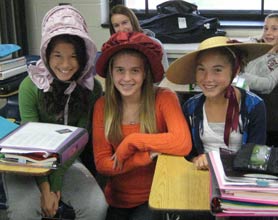
“FIELD TRIPS IN YOUR CLASSROOM”
If you are looking for an amazing immersion style learning experience for your students you might consider a “field trip in your classroom.”
You select the desired programming. Time Traveler Trunks comes to your school and sets up various stations that your students will rotate through during the day. All trunks are hands-on and answer essential questions in American history.
These programs were created for educators who wanted to eliminate complicated district forms, the use of buses, and the need for parent chaperones. In addition, it alleviates permission slips and creating activity schedules for students not able to attend.
“Field Trips in a Classroom” are available for Native Americans of the Eastern Woodlands, Colonial and Early American Life, Pennsylvania German Culture, Civil War and the Carlisle Indian Industrial School. Other options include activity days for the Victorian America and World War I, World War II, and the Cold War.
Possible Stations for Native Americans of the Eastern Woodlands:
History of the Six Nations
Regalia
Food Preparation and Use
Body Decoration
Native Crafts and Skills
Hunting and Trade
Tools and Weapons
Warfare
Native Games
Ceremony and Traditions
Music and Dance
Life at the Carlisle Indian Industrial School
Sports at the Carlisle Indian Industrial School
Art at the Carlisle Indian Industrial School
Possible Stations for Colonial and Early American Life:
Colonial Toys
Colonial Life and Clothing
Butter Churning
18th Century Games
18th Early Medicine
18th Century Craft
Local figures in Early County History
18th Century Crime and Punishment
French and Indian War
American Revolution
Activities from the War for Independence
Story of Molly Pitcher
Possible Stations for Civil War:
Life in Cumberland County during the War
Munitions Technology
Slavery in Cumberland County
Invasion of Cumberland County
Slave Trade and the Limbo
Local Heroes of the War
Civil War Era Movement
Morse code, Signal Flags, and Ciphers
Civil War Disease and Medicine
Military Drill
Possible Stations for Pennsylvania German Culture:
Pa German Foods
Folk Medicine
Superstitions
Holiday Traditions
German Crafts
Pa German Games
Document and Furniture Decoration
Decorative Paper Cutting
Possible Stations for World War II:
Lend Lease Exercise
War Bond Activity
Rationing Exercises
Naval Combat Activity
Geneva Convention Exercise
Scrap Drives
Plane Spotting Activity
Targeting and Engineering Exercises
Period Correct Games
Military Life and Munitions
POW Activity
Genocide Exercise
Local Heroes of WWII
Possible Stations for Cold War:
Duck and Cover Drills
Baby Boomer Activity
Teen Culture and Dance
Hawaii and Alaska Activities
Communism Exercise
Scientific Superiority Activity
Censorship Exercise
Rock and Roll and Racism Exercise
Polio Activity
Life in the 1950s
War in Korea
Option: Have parents make appropriately themed foods to finish the event with a period correct food sampling. Recipes can be provided. Some schools have obtained grants that permit the cafeteria staff to develop and implement an appropriate lunch which is served to the entire school.
County Seat “Walking Tour” in the Classroom
Without leaving the school, throughout a series of stations students will learn of the founding and establishment of Cumberland County. You will come to understand the meaning and importance of the old courthouse, the old prison, the old graveyard, the First Presbyterian Church, and the hardships and triumphs of early life in Central Pennsylvania.
Essential questions
How was Pennsylvania established?
What are Cumberland County’s landforms, geography, and natural resources?
Who were Cumberland County’s earliest settlers, why did they come to this area, and what were their unique characteristics?
In what ways did county residents contribute to American culture?
What other immigrant groups came here?
How were they affected by Penn’s Holy experiment?
In what ways did early county settlers express freedom of religion and speech
What services were provided by county government?
What were some of the basic principles held by American citizens?



